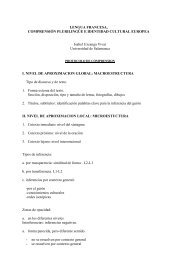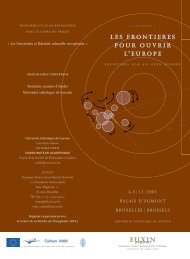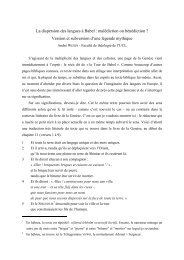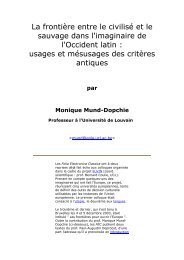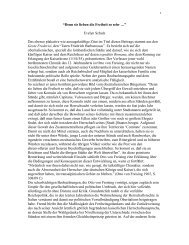Simon Pierre Nothomb - Euxin
Simon Pierre Nothomb - Euxin
Simon Pierre Nothomb - Euxin
Create successful ePaper yourself
Turn your PDF publications into a flip-book with our unique Google optimized e-Paper software.
EUROPE<br />
CULTURALLY SPEAKING, OUR DIFFERENCES ARE OUR CHANCE<br />
<strong>Simon</strong> <strong>Pierre</strong> <strong>Nothomb</strong><br />
A little over two years ago, at the end of a meeting of high lever European civil servants, the<br />
chairman of the proceedings asked each of those present to sum up his thoughts about the<br />
topic on the agenda. The first person to respond commanded a respectful silence and began<br />
by saying: "For my pan, as a jurist, 1 think that ". The next person caught attention by his<br />
opening remark that, "Me, I am an economist When the third person began with a timid-<br />
"From ;a humanist point of view, or should 1 say cultural there was a moment of<br />
astonishment followed by smiles and even a little absent-minded derisive laughter.<br />
For these civil servants, to talk of culture is tantamount to a change of creed, to an acceptance<br />
of a heart-rending renunciation of what constitutes both their method of working end en<br />
instrument of unification that has served them well for fifty years; namely standardisation,<br />
rules of conduct and uniformity applied to everything that separates them, from laws to green<br />
peas.<br />
What is worse, the multiplicity of cultures and multilingualism seem to them, when viewed<br />
together, like a structural and material inconvenience, even a major obstacle to the unity of<br />
our European community, not forgetting that this word still evokes old totalitarian demons.<br />
And yet European culture exists.<br />
It is perfectly understood by the other continents as soon as it ex-tends beyond linguistic<br />
expression. And not only for Beethoven, da Vinci, Descartes end their colleagues,, not only<br />
for Tintin and Nils Holgersson who are also European - but also for styles that label technical<br />
competitiveness, from the car to the rocket, not forgetting the enduring wish for a European<br />
social model.<br />
At the cultural lever, the European challenge consists of convincing oneself that the absence<br />
of a single language, that the wish to conserve end enhance all languages and cultural<br />
specificities, does not exclude another common culture, the culture of cultures. This<br />
constitutes Europe's most authentic, most exclusive and the most creative originality. It is its<br />
main asset vis-à-vis other juridical and economic entities with which it shores the future of the<br />
world.<br />
But how can we organise this effervescence, optimise this creativity, make each European<br />
aware and proud of his or her own cultural values ?<br />
By a timid clause in the Maastricht Treaty, cultural heritage from now on comes under the<br />
competence of the Community and General Directorale X in particular, headed by<br />
Commissioner Oreja. With his support, the Group of Coimbra, which brings together thirtythree<br />
of Europe's oldest and most distinguished universities, located outside the capital cities,<br />
entrusted eight of its members to undertake an extensive consultation in order to underline<br />
the. fundamental characteristics which structure and identify European culture, to highlight<br />
those that are common to Europe as a whole and analyse how these characteristics operate<br />
within regional and national linguistic identities. The aim ls to show how the European
cultural identity is not an inert juxtaposition of different components, but a dynamic<br />
interaction of factors that are at once common and specific : how a Spaniard is European in<br />
his own Hispanic identity, a Greek in his Hellenic identity, a Belgian in his Walloon or<br />
Flemish identity, etc.<br />
This ambitions enterprise began on 26 October 1998 in Louvain-la-Neuve (Belgium), where<br />
the Group of Coimbra was founded fourteen years ago. Professor Bernard Coulie, President<br />
of the Oriental Institute and academic co-ordinator of the whole operation, hosted a seminar<br />
that brought together specialists -to fine tune a reading card of European culture that is<br />
applicable equally to artiste productions, whether literary, architectural, musical, graphic or<br />
others, as well as to behaviour such as culinary traditions, fashion trends or even social<br />
models for protection and savings. It is with this instrument that has been forged together that<br />
the other participating universites, Turku, Bergen, Bologna, Cambridge, Heidelberg,<br />
Montpellier, Salamanca and Thessaloniki will examine - each with cultural input from their<br />
region - the more particular themes of philosophy and low, for example, but also the<br />
environment, social life, the exchange of goods and ideas, etc., and, here, Middle Europe.<br />
At the end of the first experimental year, all the other centres of reflection and cultural action<br />
in Europe will be approached to join the debate.<br />
This research has objectives that are very practical in nature- It will serve as the basis for<br />
building a positive history of Europe where the spirit and the arts, including the art of living,<br />
have always transcended frontiers and front limes. Think, for example, of education manuals,<br />
tourist guides, etc.<br />
It is not a question of fabricating a sterile European culture in order to conquer some parts of<br />
the market. It is a wish to protect our capacity for innovation from the steamroller of<br />
commercial cultures that are trivial by definition, banal, unrefined and debilitating.<br />
The universities are lending their experience to this consultation. They are the natures<br />
resonance chamber for the cultural projects of their environment end the privileged site for<br />
encounters between generations, and therefore the transmission of savoir-être end savoirvivre.<br />
There can be no university without culture. There would be no European culture<br />
without the universities.<br />
Europeans - imprisoned as they are in their national or regional culture - still doubt the<br />
existence of a European culture. They are continuously invited to escape from this routine by<br />
commercial cultures from abroad, whether they are packaged and standardised products with<br />
some European flavour, such as Wait Disney films for instance, or computer-like horrors of<br />
the electronic era. Goldorak or the Ninja Turtles that can be consumed without any serious<br />
chewing, like MacDonald's.<br />
Europe has exercised a real authority over world culture because it has always been open to<br />
outside influences, as well as to productions of original products in many languages.<br />
I use a market vocabulary here. This is a fact, a failing of our time, Europe has been<br />
conceived as a market, not as a cultural entity. The Economic Community was the opposite,<br />
the remedy against bellicosity, against war.
When steel and iron production capacity were put together under one supreme authority in the<br />
Fifties, it was - at that time - the best way to suppress national tendency towards war.<br />
This led, by extension, to the idea and ideal of a larger market that comprised all production<br />
capacity, even agriculture which had been treasured in the past as the guarantee of autonomy<br />
for each country, of self-sufficiency.<br />
Culture was cautiously avoided at that time, it represented the las't bastion of patriotism, the<br />
last force of mobilisation. In France in the Fifties, you still could not invoke Goethe or<br />
Ölderlin without adding that they were not real representatives of the abhorred German soul,<br />
without proving that they were exceptions.<br />
In Michael Naumann's statement, there is still a lingering doubt; “… if it exists ..." Michael<br />
Naumann is Germany's newly appointed Secretary of State for Culture, the first in the history<br />
of democratic Germany.<br />
Today and during the following seminars in the other universities, we will try to assess the<br />
extent to which this European culture exists and how the Union could enhance and promote it.<br />
To attain this result, we will not apply the approach that was used at first for building Europe<br />
from top to bottom, the "top - down" approach. Instead, we will do the reverse, starting from<br />
the regions to convince the upper echelons, because European culture is also daily life,<br />
comportment, the ability to admire and appreciate diversity.



